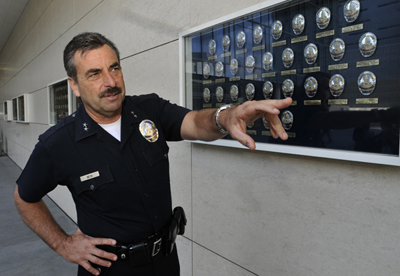
LAPD Chief designate Charlie Beck points out some of the badges belonging to officers he has served with who have died while on the job. The badges are on the wall leading to the entrance of the new LAPD administration building in down town Los Angeles. (Photo: John McCoy / Daily News)
LAPD: Deputy chief says he won't to get too comfy before it's official.
Even though his confirmation as Los Angeles police chief is a virtual certainty, Deputy Chief Charlie Beck has stayed away from the 10th floor - where his new offices are located.
"Not been up there, not going up there," Beck said in an interview Friday from his sixth-floor office at the new Police Administration Building. "I'm kind of like a ballplayer who doesn't want to do anything to jinx it."
Beck's nomination as the 55th chief of the Los Angeles Police Department is to be considered by the City Council on Tuesday. Based on interviews with a majority of the council, the vote for his five-year contract to succeed William Bratton seems assured.
Beck has been on an almost-campaign-like schedule since Mayor Antonio Villaraigosa announced his nomination on Nov. 3 in front of the Getty House mansion.
There have been town halls throughout the city - events Beck said have amazed him in the near universal support he has seen for the department.
"I've been basking in the glory of the LAPD," Beck said. "It is truly amazing."
Beck said it is a far different response than he remembers when he was on patrol in the Watts area of Los Angeles.
"I would be driving by and see absolute hate toward the police, even from little kids," Beck said. "Now, when you drive through, people wave. It is a different LAPD."
Beck credits Bratton for the change, saying that when Bratton was hired seven years ago it helped reinforce the views he had on how policing in Los Angeles needed to change.
His goal, Beck said, is to drive that home throughout the department.
Beck has made substantial outreach in the days since his nomination and has been winning high marks around the city.
Earl Ofari Hutchinson, president of the Los Angeles Urban Policy Roundtable, arranged a meeting this week between Beck and African-American leaders.
In the middle of that session, the Rev. Al Sharpton called to offer his support for Beck's nomination.
"One of the main questions we had is his commitment to the Bratton reforms," Hutchinson said. "I think he gave us all the right answers. But we will see. We will be watching him.
"We are sure he will do well on the policing side. ... What we want to see is how he does politically. Can he come in at a time when politics gets fierce and still do the job?"
Beck acknowledges it is an area he will have to learn.
"One of our famous former chiefs was teasing me about having to be a politician," Beck said without identifying who it was. "The reality is to get the job done you have to be a politician."
It appears he'll get off to a good start with the City Council.
Councilman Bernard Parks served as chief before Bratton and was the lieutenant in charge of recruitment when Beck joined the force.
"I remember thinking then that he would be a good police officer and he was," said Parks, who also was in charge when Beck was promoted to captain. "He will do an excellent job."
Beck, 56, grew up with the LAPD. His father, George, was a deputy chief.
He worked his way up through the ranks and, over the years, was given some of the most difficult assignments in the department - anti-gang units, taking over Rampart Division after its scandals, moving to deputy chief of detectives with responsibility over the crime lab.
When Bratton announced his resignation and urged Beck and the other command teams to apply for the job, he decided to apply.
"When I talked to my dad... he gave me a look that said, 'Are you crazy?"' Beck said.
"My life already is changed and it will change more... You give up your life for a certain amount of time to serve the city."
Beck spent most of his career in South Los Angeles, never working the San Fernando Valley, but he believes the issues are the same and he will rely heavily on the Valley Bureau's Deputy Chief Michel Moore - one of the other contenders for the chief's job.
"He has done a tremendous job there and I will count on him to advise me," Beck said.
"The issue in the Valley is that it is so large, but the crime is localized," he said.











